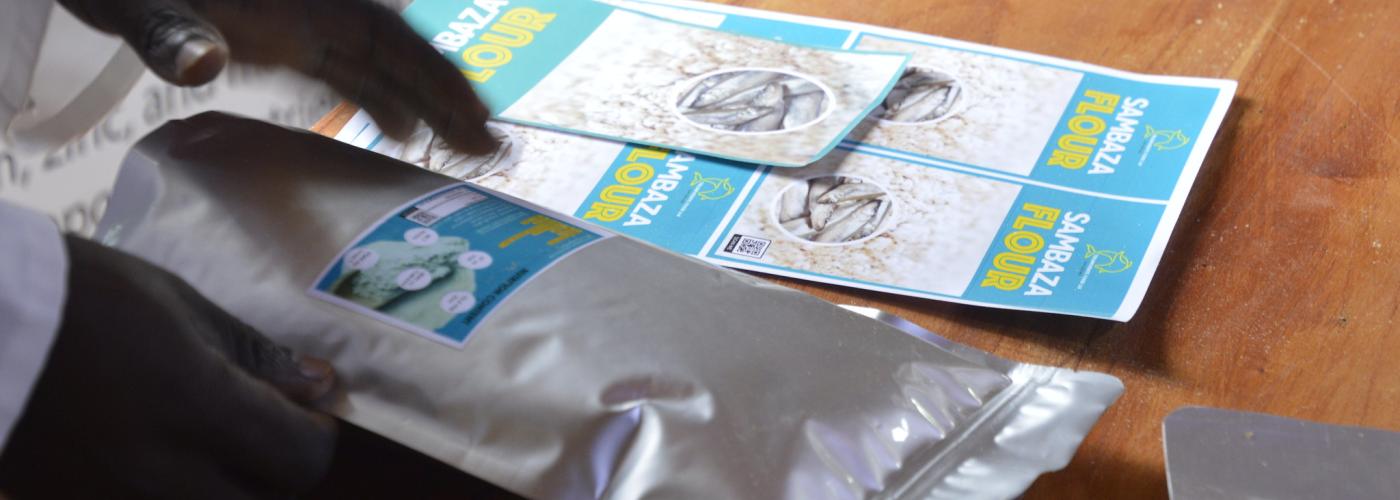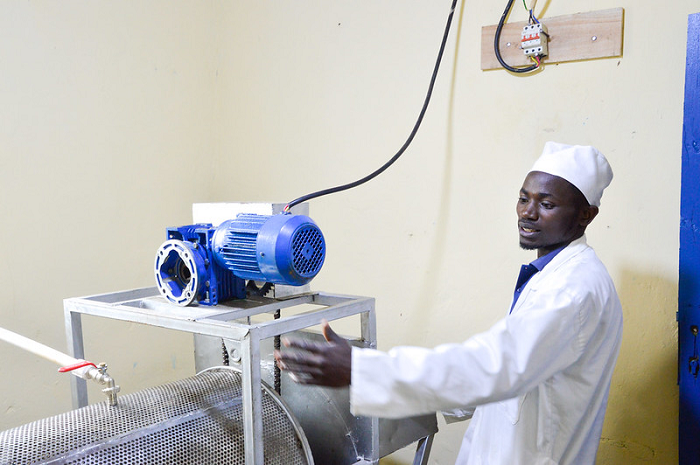Scaling up a Youth-Owned Fish Business to Combat Malnutrition
Image

In Rwanda, the expansive Lake Kivu is known for its views… and for its fish. Just minutes away from its banks, a small emerging business is taking advantage of its proximity. Triumvirate Food Co. Ltd. started sourcing sambaza — minnow-like fish akin to smelt — in 2022. The concept of Triumvirate is simple but innovative: harness the large supply of fish and process it into a shelf-stable fish flour that can help round out the nutrition content of meals. Think of it as a sustainably sourced nutrition supplement. The powder can be used in almost any savory Rwandan family meal and works well to add nutrients to young children’s porridge.
Amani’s Story: Starting a Fledgling Sambaza Business to Provide for his Family
Triumvirate’s team is small but mighty. At its helm, a charismatic 30-year-old named Amani owns and manages the business. Amani shares how he first started selling sambaza out of pure necessity: he grew up with a single mother in Kigali and needed to support his family. Starting a business is never easy, and Amani explains that young business owners often face tougher challenges than other entrepreneurs. For one, access to capital and finance is difficult for young people. Amani explains, “You might have a great idea … but many banks do not trust young people with loans.”
But, Amani also sees the silver lining to being a young entrepreneur: “It gives you courage to dream big.” Triumvirate hopes to increase its production capacity from 550 to 4,400 pounds of fish flour per month, as well as improve its packaging, distribution, and marketing. With a grant from Feed the Future Orora Wihaze activity, Triumvirate furnished its processing facility in Nyamasheke District with a machine to wash raw fish, a drying machine, a milling machine, a vacuum sealer, and packaging machine. Orora Wihaze is supporting the company to get a product standard certificate from Rwanda Standard Board (RSB). With the certification, Triumvirate will be able to increase availability and accessibility of a nutrient-dense food at rural local markets that is affordable for low-income household families.

Tackling Malnutrition Using a Market Systems Approach
A diverse diet of nutrient-rich foods is critical if people are to meet their nutrient requirements through food. However, nutrient-dense foods, like those of animal origin, can be inaccessible and unaffordable, with disproportionate nutritional consequences for women and young children. Rwanda has high chronic malnutrition rates, with 33 percent of children under the age of five facing chronic malnutrition, according to the 2020 Rwanda Demographic Health Survey.
To tackle some of malnutrition’s causes rooted in the market system, Orora Wihaze applied a behavioral analysis to prioritize consumer needs related to their ability to consume more animal-source foods. The primary hurdle consumers in rural Rwanda face faced is easy access to affordable products, particularly those that are appropriate for young children. In this respect, the product that Amani wants to produce and market is ideal and will fill a much-needed gap in the diets of many rural Rwandans. Amani’s dream is more than just a business opportunity: It’s a creative way to take a sustainable, locally sourced food and transform it into an accessible meal complement..
Product Testing: Understanding Consumer Preferences
Prior to launching any product on the market, it is wise to understand consumers’ reactions.. To set the business up for success, Triumvirate needed to ensure its product made sense for families’ day-to-day meal preparation and that it was an acceptable product for children under the age of two. To better understand preferences, Orora Wihaze partnered with Triumvirate to conduct market research with potential customers, including early childhood development centers that feed young children every day. The consumer market study used an innovative method, Trials of Improved Practices (TIPs). The study asked potential customers to try the product for two weeks then interviewed participants to understand how they used it, their reactions (negative and positive), and their willingness to purchase the product in the future. The TIPs study offered consumers two types of fish powder: the unroasted powder that Amani was already producing and a roasted option that is used in other countries.

The study found that the fish flour was tremendously popular among potential customers living near the lake and eating fish frequently — as well as those further from the lake with less access. Caregivers provided it almost daily to their children in their porridge and, although they found both forms of the powder acceptable, children preferred the roasted version because it was less “fishy” tasting. Many caregivers, including those at the early childhood development centers, reported that the children liked the taste of their porridge with the powder and said they ate more: it seemed, over time, to have increased their appetite. A few mothers reported improvement in their child’s growth at their recent health center visit.
Family members were also enthusiastic about the taste of the fish flour mixed with their food. While there were a few dishes that were favorites with fish flour (anything with green banana or potatoes mixed with amaranth or cassava leaves and sometimes beans), nothing seemed to be rejected. Adults preferred the unroasted version because of its excellent fish smell and flavor, and they felt assured that it was prepared with authentic, local sambaza. Participants also mentioned that the product was easy to use, requiring no preparation. They also were satisfied with the idea that the product could allow them to consume fish during the off-season. Whereas fresh sambaza are quick to spoil, Triumvirate’s fish flour has a shelf life of six months.
Ultimately, the research found significant interest in the product, although some customers were concerned with the product’s price and availability. Amani is sensitive to these issues, and he is leveraging the survey results to make his product palatable for local markets. The research helped him realize that smaller packages would be less cost-prohibitive to his customers and helped him recognize a need to include the roasted product for young children.






